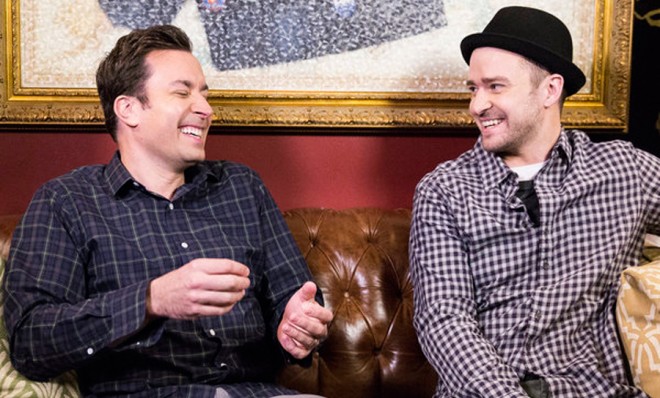In defense of hashtags
Saying exactly what you want to say on a screen is hard. Hashtags help.

A free daily email with the biggest news stories of the day – and the best features from TheWeek.com
You are now subscribed
Your newsletter sign-up was successful
In a recent sketch on Late Night with Jimmy Fallon, the host and his fedora'd pal Justin Timberlake had some rather incisive social commentary about the pervasive hashtagization of pop culture. Specifically, the two sought to illustrate how young people are abusing the symbol formerly known as a pound sign in just about every trendy forum on the internet. They also played out a thought experiment: What would hashtags sound like if we said them out loud?
The results, understandably, were ridiculous.

"Hashtag I did it all for the cookie!" said Timberlake as Fallon pretended to eat said cookie in a manner reminiscent of a famous blue muppet. "Hashtag lolololololololololol… [trailing off]."
The Week
Escape your echo chamber. Get the facts behind the news, plus analysis from multiple perspectives.

Sign up for The Week's Free Newsletters
From our morning news briefing to a weekly Good News Newsletter, get the best of The Week delivered directly to your inbox.
From our morning news briefing to a weekly Good News Newsletter, get the best of The Week delivered directly to your inbox.
The bit had its moments, though the pair did admittedly take an "oh-so-relevant joke to the extreme," as Adrianne Jeffries at The Verge writes. By late-night talk show standards it's actually pretty contemporary — not quite as savvy as Jimmy Kimmel's troll-hard twerking stunt, but topical enough for the internet to momentarily care, which says a lot.
Hashtags, for the uninitiated, have reached something of a saturation point, rearing their funky geometry in tweets, Instagram tags, movie posters, weird names for DJ collectives, and even in the egregious titles of breezy pop songs by well-respected musicians like Mariah Carey and Miguel.
Ostensibly, slapping a hashtag in front of a word or phrase was conceived by Twitter as an elegant way to compartmentalize information, to parse through the gazillion words mindlessly tossed into the ether and place them into digital sock drawers organized and labeled by hashtags. On Twitter, the sheer breadth and variety of the hashtag as container can be astounding, capturing conversations on subjects as varied as #Syria and #ReplaceMovieTitlesWithTheWordButt.
Since then, though, the hashtag has taken on additional tasks, namely (and as Mr. Timberlake and Mr. Fallon illustrate in their lighthearted critique) for bringing one-off ideas to fruition without having to form complete sentences.
A free daily email with the biggest news stories of the day – and the best features from TheWeek.com
Which brings us back to the sketch. While the over[blank]ization of anything rightfully deserves our collective scorn, I'm afraid that shaming digital natives for their earnest use of hashtags might actually be doing more harm than good. Nevermind that the critique is being handed down by multi-millionaires who presumably have compensated social media assistants holding their phones for them. The implicit message of the skit is pretty clear: Hashtags are dumb things that dumb people use to make Twitter and Instagram insufferable.
So here's my #SlatePitch: Hashtags are valuable. They add context. And context allows humans to more accurately give their thoughts form, thus making us more effective communicators.
Clever turns of phrases and complete sentences are wonderful and all, but they are, by nature of the itty-bitty dot often found punctuating them, finite in form. If face-to-face conversation is the Platonic ideal for understanding one another — allowing us to immediately convey subtleties like empathy, enthusiasm, frustration, or nuance by twitching our face muscles or by inflecting tone — the written word has a much smaller emotional palette from which to draw from. Saying exactly what you want to say on a screen is hard. Anyone who has ever read too much into a text message can tell you that.
Hashtags expand our expressive and emotive vocabulary. In a way, our growing insistence on hashtags to convey real, fleeting feelings like #lol and #sad aren't so different from the growing popularity of emojis. As writer Britt Peterson says in the Boston Globe, the tiny illustrated characters help us fill a void, granting "curt text messages a layer of expressive complexity." That photo of your new Boston terrier puppy with #LOVELOVELOVE underneath it? Pretty much the same deal.
And sure: The world's more egregious hashtag abusers may be making Instagram feeds more annoying, but that speaks to them being annoying people first and foremost. You can unfollow them.
So feel free to hashtag away, guilt-free. It rounds you into form as a three-dimensional human confined to a two-dimensional format. #Yolo, after all. #DoYou.
-
 Munich Security Conference: a showdown between Europe and Trump?
Munich Security Conference: a showdown between Europe and Trump?Today’s Big Question Report suggests European leaders believe they can no longer rely on the US for military support – but decoupling is easier said than done
-
 The Week Unwrapped: Have televised confessions quelled protests in Iran?
The Week Unwrapped: Have televised confessions quelled protests in Iran?Podcast Plus, why has Elon Musk turned from Mars to the Moon? And will the BBC prove to be a puzzles champ?
-
 The week’s best photos
The week’s best photosIn Pictures An Andean god, a rogue squirrel, and more